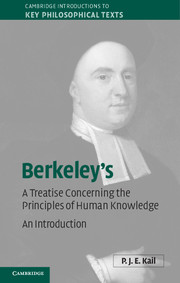Book contents
- Frontmatter
- Dedication
- Contents
- Acknowledgements
- Chapter 1 Introduction
- Chapter 2 Context and aims
- Chapter 3 The Introduction to the Principles
- Chapter 4 The argument for immaterialism
- Chapter 5 Against the philosophers: the refutation of materialism
- Chapter 6 Reality and God
- Chapter 7 Science and mathematics
- Chapter 8 Spirits
- Bibliography
- Index
- References
Chapter 4 - The argument for immaterialism
Published online by Cambridge University Press: 05 June 2014
- Frontmatter
- Dedication
- Contents
- Acknowledgements
- Chapter 1 Introduction
- Chapter 2 Context and aims
- Chapter 3 The Introduction to the Principles
- Chapter 4 The argument for immaterialism
- Chapter 5 Against the philosophers: the refutation of materialism
- Chapter 6 Reality and God
- Chapter 7 Science and mathematics
- Chapter 8 Spirits
- Bibliography
- Index
- References
Summary
Introduction
The focus of this chapter is Berkeley’s immaterialism. Immaterialism is the thesis that physical objects depend on being perceived for their existence. The term ‘immaterialism’ might make one think that Berkeley’s central claim is a merely negative one. It might, that is, encourage one to think that all there is to Berkeley’s view is the denial of material substance. Berkeley does, indeed, argue against material substance, and so among the reasons to accept Berkeley’s system is the failure of the materialist alternative. But that is not how Berkeley presents matters; he argues for immaterialism and then attacks materialism.
Berkeley’s central positive case for immaterialism can be glossed as follows. Physical objects are sensible objects, and sensible objects are nothing but collections of sensible qualities. Sensible qualities are ideas, and ideas are mind-dependent. Since physical objects are just collections of ideas, physical objects must be mind-dependent. Berkeley thinks he can prove the truth of immaterialism very quickly. By PHK §3 tells us that we can have ‘intuitive’ knowledge that the absolute existence of sensible objects ‘without the mind’ is ‘perfectly unintelligible’, and in PHK §7 he declares that from ‘what has been said, it follows there is no other substance than spirit, or that which perceives’. Sadly, Berkeley’s brevity in exposition cannot be matched by equal brevity in interpretation. Just what Berkeley means by terms such as ‘perceived’, ‘perception-dependence’, ‘spirit’ and ‘idea’ is not obvious at first glance, and commentators are still arguing about understanding even these fundamental concepts.
- Type
- Chapter
- Information
- Berkeley's A Treatise Concerning the Principles of Human KnowledgeAn Introduction, pp. 54 - 69Publisher: Cambridge University PressPrint publication year: 2014



